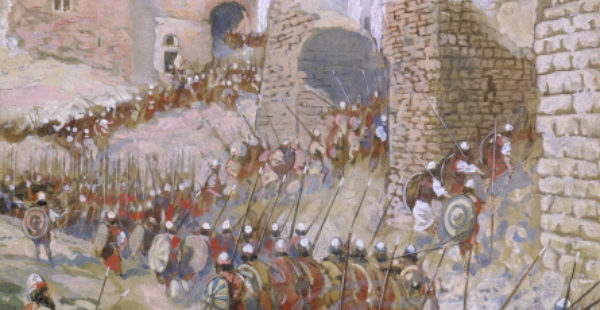
Timothy Talks: Does God Command Genocide?
Podcast: Play in new window | Download
Subscribe: RSS
The God of the Old Testament commands His people to do some bloody things. Was it right for God to tell the Israelites to kill the peoples of Canaan? Does God command genocide?





This is a very problematic response to the question. The idea that nations’ sinfulness justified the genocide commanded in the Old Testament is an unsatisfactory answer, because that wouldn’t fly today. If God commanded us today to slaughter the nations around us wholesale because of their perversions (and because otherwise we would be led astray by them), I really hope no one would obey that command. In fact, God has commanded the exact opposite approach to sinful enemies, through Jesus’ command to love enemies.
Why this change in approach? Why weren’t the Israelites commanded to love their enemies and simply withstand their evil influence? (Especially since the Israelites didn’t withstand temptation despite all the genocide.)
That’s the truly tough question. But you probably take issue with the way I phrased it, so it won’t get an answer.
Hi Trev,
Thanks for your comment. Actually, I am happy to answer the question. As you know, trying to answer a tough Bible question in just a 20-30 minute podcast means that there is a lot more to talk about that sometimes doesn’t have sufficient time.
First, you are using the word ‘genocide’ even though I pointed out that this is NOT what God commanded. God was very merciful to these people and even gave them many opportunities to avoid the coming destruction.
However, you correctly point out that God has commanded us to love our sinful enemies. As you noted, there is a change. That change comes from the careful study of what it means to be the people of God. In the Old Testament times, God’s name was intimately connected with the people of Israel. God was in their midst. Because Israel was a special people, to fight Israel was to fight God. God was preparing for the coming of the Messiah, and He did this through working in His people Israel. He needed to teach and train the nation, and part of that was by giving them a land to live in. In those days, to become one of God’s people was to join the nation of Israel; to fight that nation was to fight God.
Of course, that has changed; God now commands ‘all men everywhere to repent.’ No longer is God’s name associated only with a nation-group called Israel. By removing the political element, we no longer fight political enemies like the Hebrews did.
The Hebrews WERE commanded to love their enemies; the Shema, the famous summation of the Mosaic Law, called on every Israelite to love the Lord AND his neighbor as himself. Extrapolating from this was the certain message that they must love even those who hate them, or whom they are enemies of (as Jesus very clearly indicated in His parable of the Samaritan [the question is not ‘who is my neighbor’ but ‘who am I called to be a neighbor to’?]). However, in the face of DIRECT REVELATION from God, the Hebrews were called on to carry out specific acts of destruction against specific people. Again, your approach to this depends on whether you believe that God, as judge, has the authority to command such actions.
Finally, we do not need to wonder what we should do today if God were ever to command something like this, because the New Testament has made clear: the political dimension which I discussed is removed. The fact that we have the completed revelation of God in the Bible makes any further direct revelations (like those to Moses, or the call to Abraham to kill his son) not only unnecessary, but inauthentic.
I hope this answers your question better. Thanks for the interaction,
Daniel
I appreciate the answer. I disagree that the Bible clearly lays out the differences between the Old and New Covenants the way you described them, but I greatly appreciate the time you took to answer my objections.